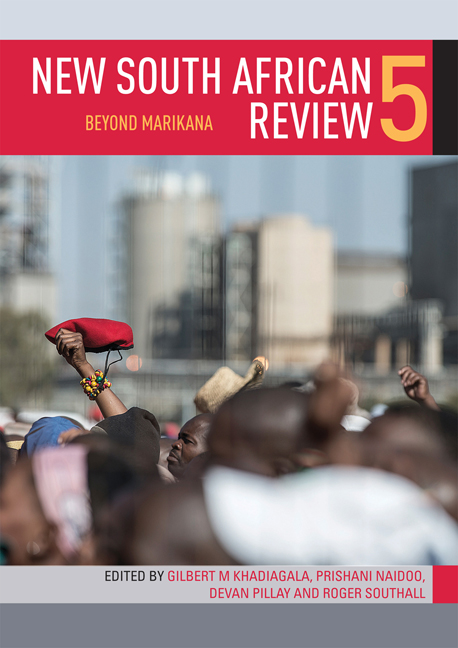Book contents
- Frontmatter
- Contents
- Preface
- Introduction: Political reconfigurations in the wake of Marikana
- PART 1 NEW POLITICAL DIRECTIONS?
- Chapter 1 Reconstituting and re-imagining the left after Marikana
- Chapter 2 Labour and community struggles 1994-2014
- Chapter 3 Half full or half empty? The Numsa moments and the prospects of left revitalisation
- PART 2 ECONOMY, ECOLOGY AND LABOUR
- PART 3 STATE AND SOCIETY
- PART 4 SOUTH AFRICA IN THE INTERNATIONAL ARENA
- Contributors
- Index
Chapter 2 - Labour and community struggles 1994-2014
from PART 1 - NEW POLITICAL DIRECTIONS?
Published online by Cambridge University Press: 21 April 2018
- Frontmatter
- Contents
- Preface
- Introduction: Political reconfigurations in the wake of Marikana
- PART 1 NEW POLITICAL DIRECTIONS?
- Chapter 1 Reconstituting and re-imagining the left after Marikana
- Chapter 2 Labour and community struggles 1994-2014
- Chapter 3 Half full or half empty? The Numsa moments and the prospects of left revitalisation
- PART 2 ECONOMY, ECOLOGY AND LABOUR
- PART 3 STATE AND SOCIETY
- PART 4 SOUTH AFRICA IN THE INTERNATIONAL ARENA
- Contributors
- Index
Summary
In December 2005, Khanya College dedicated a special issue of its journal Khanya to a debate about the relationship between the so-called ‘social movements’ and the Congress of South African Trade Unions (Cosatu). The debate had been sparked by the launch of a ‘new UDF’ in Cape Town on 22 August of that year, which sought to call upon the legacy of the anti-apartheid United Democratic Front that was prominent in the 1980s. The new formation was essentially an attempt by Cosatu in the Western Cape to build broader support for its new ‘jobs and poverty’ campaign, and saw the labour federation working with partners such as the Cape Town-based nongovernmental organisation (NGO), the Alternative Information Development Centre (AIDC). Notably, however, the launch received a critical response from community-based organisations affiliated with the most prominent Cape Town social movement, the Anti-Eviction Campaign.
The debate centred around the political orientation of social movements – a group of organisations with deep roots in township communities – and in particular the question of whether they should join initiatives such as the new UDF. But beneath this question lay a whole host of other questions regarding the state of the working class and working-class struggle in South Africa:
• Who are the most active and forward-looking sections of the working class: organised workers in unions, or casualised workers and the unemployed with little connection to organised labour?
• What should be the primary object of the struggle against neoliberal capitalism: more jobs and better conditions in the workplace, the so-called sphere of production, or access to free basic services and housing in the community, the so-called sphere of reproduction and consumption?
• What are the most effective forms of struggle: those that have strong leadership and organisation, or those that are more spontaneous and fluid?
• Finally, to what extent is the challenge to neoliberal capitalism dependent on a clean break with the African National Congress (ANC)? Alternatively, to what extent may it be possible to develop this challenge from within the Tripartite Alliance?
A contribution by Oupa Lehulere of Khanya College lay at the centre of the debate. He criticised ‘old left’ activists for placing too much emphasis on Cosatu. For him, the labour federation had become a conservative bureaucracy, tied to the ANC and complicit in the ruling party's embrace of neoliberalism.
- Type
- Chapter
- Information
- New South African Review 5Beyond Marikana, pp. 34 - 47Publisher: Wits University PressPrint publication year: 2015



